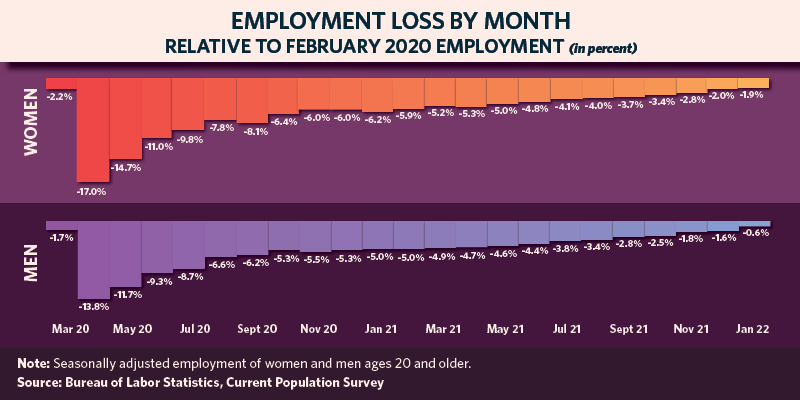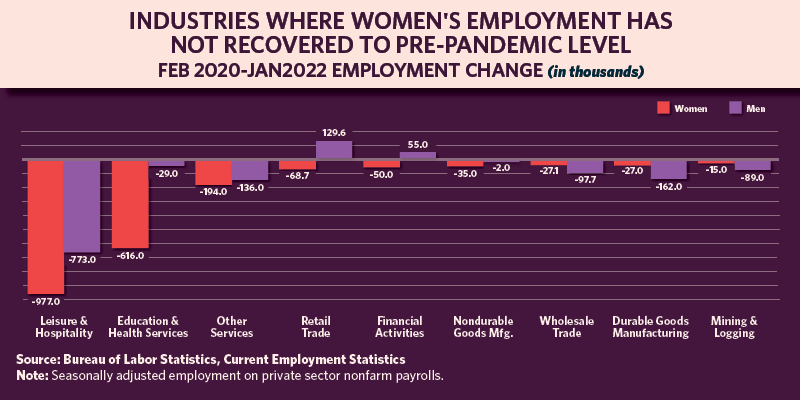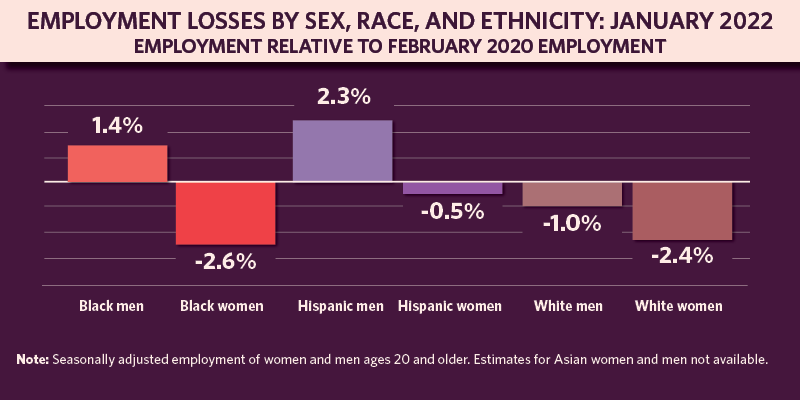The jobs data for January 2022 far exceeded expectations in job creation in the midst of the ongoing Omicron variant wave. The private sector added 444,000 jobs, driven by growth in leisure and hospitality, professional and business services, retail trade, and transportation and warehousing. The overall unemployment rate remained little changed at 4.0%, and accounting for upward revisions of prior months’ data, President Biden’s first year in office ended with a total of 6.6 million jobs gained.
However, most of the job gains have gone to men, with women only gaining 40.3% of jobs in January and 40.1% of total new jobs over the last three months. Women workers are still down 1.8 million jobs relative to February 2020, while men are down 1.1 million jobs. And there are still 1.4 million (1.9%) fewer employed adult women than pre-pandemic, compared to 500,000 (0.6%) adult men.
(The difference between the number of jobs and employed women is influenced by the fact that women are more likely than men to hold more than one job.)

These gendered differences are largely driven by occupational segregation with women more likely to work in the sectors of the economy that lost the most jobs. There have been recent gains in sectors that were disproportionately impacted by shutdowns and decreased demand like leisure and hospitality and the retail trade. But these gains have not been enough to overcome the devastating job losses – most of them incurred by women – in 2020. As of January 2022, women workers are still missing over 616,000 education and health services jobs and over 977,000 leisure and hospitality jobs relative to when the pandemic began.

But these topline statistics on employment outcomes for women and men mask significant differences by race and ethnicity. Black and Hispanic adult women experienced the steepest job losses during the pandemic, but their recoveries have diverged recently. Since November, Hispanic adult women’s employment gains are outpacing those of adult Black and white women. Adult Black women’s unemployment rate is 1.8 times their white counterparts, is the highest among women and men by race and ethnicity (5.8%), and is still a full percentage point above its pre-pandemic level. Black women’s employment has recovered the least among major race and ethnicity groups, with 2.6% fewer adult Black women employed in January 2022 than February 2020.

The different experiences of Black women in the pandemic and the recovery are caused by multiple overlapping factors:
-
First, before the pandemic Black women were disproportionately likely to be employed in some of the hardest hit sectors. For example, in 2019, Black women made up only 6.6% of all employees in non-agricultural industries but were 11.6% of all employees in education and health services.
-
Data from prior recessions shows that when there are economic shocks, Black and Hispanic workers are more vulnerable to losing their jobs and recovery takes longer for Black and Hispanic women. While Black women were slightly more than 1 in 10 workers in the education and health services industry in 2019, when comparing annual data from 2019 to 2021 they represent roughly 1 in 6 (17.4%) jobs lost.
-
Black women also are overrepresented in the care economy, and the ongoing crisis in this sector continues to have a disproportionate impact on Black women.
The intersection of racism and sexism means that Black women are experiencing a different, and more difficult, recovery not just because of the types of jobs they are likely to hold, but also because they are treated differently within those jobs. One way to help dismantle the barriers facing Black women is to ensure that all new jobs embed equity into hiring and promotion practices. Through our Good Jobs Initiative, we’re improving job quality and creating access to good jobs that are free from discrimination and harassment. Find information about the Good Jobs Initiative here.
Sarah Jane Glynn is a senior advisor and Mark DeWolf is a senior economist in the Women’s Bureau. Follow the bureau on Twitter: @WB_DOL.
Source data:
Click to see source data for Black men’s employment.
Click to see source data for Black women’s employment.
Click to see source data for Hispanic men’s employment.
Click to see source data for Hispanic women’s employment.
Click to see source data for white men’s employment.
Click to see source data for white women’s employment.
Click to see source data for Leisure and hospitality employment.
Click to see source data for Leisure and hospitality women employees.
Click to see source data for Education and health services employment.
Click to see source data for Education and health services women employees.
Click to see source data for Other services employment.
Click to see source data for Other services women employees.
Click to see source data for Retail trade employment.
Click to see source data for Retail trade women employees.
Click to see source data for Financial activities employment.
Click to see source data for Financial activities women employees.
Click to see source data for Nondurable goods manufacturing employment.
Click to see source data for Nondurable goods manufacturing women employees.
Click to see source data for Wholesale trade employment.
Click to see source data for Wholesale trade women employees.
Click to see source data for Durable goods manufacturing employment.
Click to see source data for Durable goods manufacturing women employees.
Click to see source data for Mining and logging employment.
Click to see source data for mining and logging women employees.

 U.S. Department of Labor Blog
U.S. Department of Labor Blog